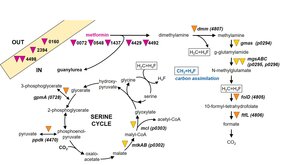The antidiabetic drug metformin is a first-line drug against type II diabetes, and one of the most prescribed antidiabetic agents (150 million people worldwide). It is also considered for other therapeutic applications including cancer and endocrine disorders. Metformin remains largely unmetabolised by human enzymes. At daily doses of 0.5-2.5 g per patient, it has become a dominant micropollutant in wastewater treatment plants and aquatic environments. Its potential toxic effects are still debated, with reported detrimental effects in aquatic organisms and potentially also in humans.
Here, microorganisms are on the frontline, developing the capacity to enzymatically transform chemical contaminants, and to tolerate their toxic effects. Microbial one-carbon metabolism, by transforming molecules lacking carbon-carbon bonds for growth, can play a key role in degrading many pharmaceuticals such as metformin, with carbon atoms exclusively linked to atoms of other elements.
To our knowledge, no microorganism capable of using metformin as a carbon and nitrogen source for growth had yet been reported. Here, we describe Aminobacter niigataensis strain MD1, an aerobic methylotrophic bacterium capable of using metformin as its sole carbon, nitrogen and energy source for growth and isolated from activated sludge of the wastewater treatment plant of the City of Strasbourg. The genome of strain MD1 was sequenced, its metabolism of metformin was investigated in detail by transcriptomics and proteomics, and genes involved in growth with metformin were identified. The obtained results suggest recent evolution of the growth-supporting capacity of strain MD1 to degrade metformin.
New publication, team AIME: a bacterium feeding on metformin, a major antidiabetic drug and aquatic contaminant
[Translate to English:]
[Translate to English:]

